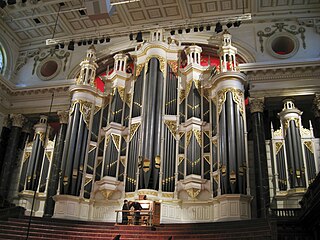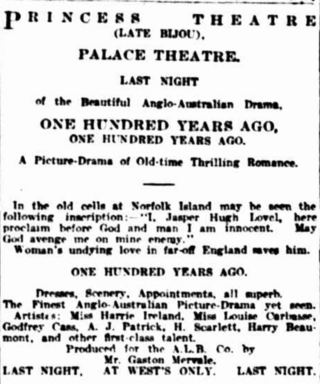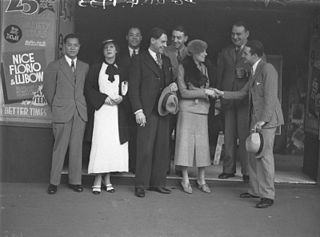Related Research Articles

The Sydney Town Hall Grand Organ is a large pipe organ built by English firm William Hill & Son in 1890. It is located in the Centennial Hall of Sydney Town Hall in Sydney, New South Wales, Australia.

Lottie Lyell was an Australian actress, screenwriter, editor and filmmaker. She is regarded as Australia's first film star, and also contributed to the local industry during the silent era through her collaborations with director and writer Raymond Longford.

George Marlow was an Australian theatrical entrepreneur born in London of Jewish extraction, noted for bringing melodrama and pantomime to Sydney audiences in the early 1900s. His name has been frequently mis-spelled as "George Marlowe".

Moonlite is a 1910 Australian bushranger film about Captain Moonlite, played by John Gavin, who also directed for producer H.A. Forsyth. It was also known as Captain Moonlite and is considered a lost film.
The Luck of Roaring Camp is a 1911 Australian feature-length film directed by W. J. Lincoln now considered a lost film. It was highly regarded in its day, in part because it was based on a play that was popular with audiences.

One Hundred Years Ago is a 1911 Australian silent film directed by Gaston Mervale. It features an early screen performance from Louise Lovely and is considered a lost film.

Sentenced for Life is an Australian film directed by E. I. Cole. It was an adaptation of a play performed by Cole and his Bohemian Dramatic Company as early as 1904.

Dan Morgan is a 1911 Australian film from Charles Cozens Spencer about the bushranger Daniel Morgan. It was said to be starring "Alfred Rolfe and company". Rolfe directed three movies for Spencer, all starring himself and his wife Lily Dampier so there is a chance he may have directed this one and that it starred his wife. A prospectus for the Australian Photo Play Company said he directed it. It is considered a lost film.
Driving a Girl to Destruction is an Australian film directed by George Marlow. It is considered a lost film.

The New Tivoli Theatre, Sydney, previously known as the Adelphi Theatre and the Grand Opera House, was a theatre and music hall at 329, Castlereagh Street, Sydney, Australia, which was long at the heart of the Tivoli circuit.
Emmeline Mary Dogherty Woolley, commonly referred to as E. M. Woolley, was an English-born Australian pianist, organist and composer.
Austral-American Productions was a short-lived film production company in Australia during the 1940s. They made two feature films during World War II, a time of low output for Australian cinema. They also produced some stage plays and exhibited films. Hartney Arthur was managing director.
The Australian Film Syndicate was a short lived Australian film production company based in North Sydney. According to novelist Arthur Wright, "A local draper put a lot of money into it, and lost it; though all the films produced were not 'duds.' One which paid its way well was an adaptation of my novel, Gamblers Gold."
Only a Factory Girl is a 1911 Australian film. Very little is known about it and it is considered a lost film.

The Municipality of Mascot was a local government area in the inner south of Sydney, New South Wales, Australia. The municipality was proclaimed as the Borough of North Botany on 29 March 1888 and was renamed to the Municipality of Mascot, in order to differentiate itself from their southern neighbour, from 31 October 1911. It included the modern suburbs of Eastlakes and Daceyville, with parts of Mascot and Pagewood. From 1 January 1949, the council was amalgamated into the Municipality of Botany, with the passing of the Local Government (Areas) Act 1948.
Charles Darrell was an English playwright who specialized in melodrama.
Wilton Welch was an Australian comic actor and dramatist, husband and collaborator of Louise Carbasse, best known as Louise Lovely.
William Dind was an hotelier and theatre manager in Sydney, Australia, where he was the longtime lessee of the Royal Victoria, and Prince of Wales theatres. He settled on Sydney's North Shore, where he was active in local government, and he and his son William Forster Dind, aka W. Forster Dind or William Dind jun, ran hotels which were popular with theatrical people.
Arthur John Mason was an Australian organist and journalist, remembered as Sydney City Organist from 1901 to 1907, when he moved to London as correspondent for the Sydney Morning Herald. He was a son of George Birkbeck Mason, musician and entrepreneur, and grandson of Abraham John Mason, wood engraver of London and New York.
Fortune's Fool is a 1897 Australian play by Alfred Dampier. It depicted "the Strange and Adventurous Career of a Vagabond Wanderer and his Daughter."
References
- ↑ "Advertising". The Sydney Morning Herald . No. 23, 008. New South Wales, Australia. 10 October 1911. p. 2. Retrieved 2 July 2024– via National Library of Australia.
- ↑ "Advertising". The Sydney Morning Herald . No. 23, 006. New South Wales, Australia. 7 October 1911. p. 2. Retrieved 1 July 2024– via National Library of Australia.
- ↑ "THE ADELPHI". The Daily Telegraph. No. 10105. New South Wales, Australia. 16 October 1911. p. 4. Retrieved 2 July 2024– via National Library of Australia.
- ↑ Williams, Margaret (1983). Australia on the popular stage, 1829-1929 : an historical entertainment in six acts. Oxford University Press. p. 247. ISBN 978-0-19-554398-8.
- ↑ "ADELPHI THEATRE". The Sydney Morning Herald . No. 23, 013. New South Wales, Australia. 16 October 1911. p. 5. Retrieved 2 July 2024– via National Library of Australia.
- ↑ "AUSTRALIAN IDEALS". The Daily Telegraph. No. 13, 524. New South Wales, Australia. 14 September 1922. p. 4. Retrieved 2 July 2024– via National Library of Australia.
- ↑ "SYDNEY SHOWS". Punch. Vol. CXV, no. 2933. Victoria, Australia. 12 October 1911. p. 37. Retrieved 2 July 2024– via National Library of Australia.